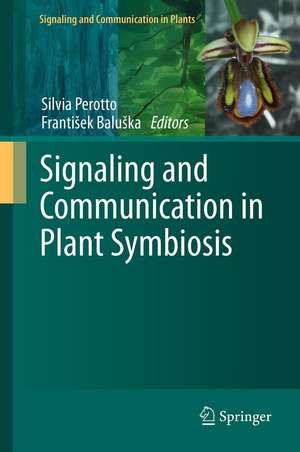Signaling and Communication in Plant Symbiosis: Signaling and Communication in Plants, cartea 11
Editat de Silvia Perotto, František Baluškaen Limba Engleză Paperback – 27 noi 2013
| Toate formatele și edițiile | Preț | Express |
|---|---|---|
| Paperback (1) | 943.43 lei 6-8 săpt. | |
| Springer Berlin, Heidelberg – 27 noi 2013 | 943.43 lei 6-8 săpt. | |
| Hardback (1) | 947.35 lei 6-8 săpt. | |
| Springer Berlin, Heidelberg – 21 sep 2011 | 947.35 lei 6-8 săpt. |
Din seria Signaling and Communication in Plants
- 15%
 Preț: 641.71 lei
Preț: 641.71 lei - 24%
 Preț: 793.47 lei
Preț: 793.47 lei - 24%
 Preț: 1208.95 lei
Preț: 1208.95 lei - 18%
 Preț: 1118.13 lei
Preț: 1118.13 lei - 24%
 Preț: 783.53 lei
Preț: 783.53 lei - 18%
 Preț: 1111.53 lei
Preț: 1111.53 lei - 18%
 Preț: 998.34 lei
Preț: 998.34 lei - 18%
 Preț: 1545.57 lei
Preț: 1545.57 lei - 18%
 Preț: 1547.81 lei
Preț: 1547.81 lei - 18%
 Preț: 951.29 lei
Preț: 951.29 lei - 24%
 Preț: 796.83 lei
Preț: 796.83 lei - 18%
 Preț: 942.63 lei
Preț: 942.63 lei - 18%
 Preț: 1219.77 lei
Preț: 1219.77 lei - 18%
 Preț: 954.31 lei
Preț: 954.31 lei - 18%
 Preț: 953.20 lei
Preț: 953.20 lei - 18%
 Preț: 1388.05 lei
Preț: 1388.05 lei - 18%
 Preț: 956.50 lei
Preț: 956.50 lei - 18%
 Preț: 942.63 lei
Preț: 942.63 lei - 18%
 Preț: 943.73 lei
Preț: 943.73 lei - 24%
 Preț: 1053.39 lei
Preț: 1053.39 lei - 18%
 Preț: 941.48 lei
Preț: 941.48 lei - 18%
 Preț: 943.57 lei
Preț: 943.57 lei - 18%
 Preț: 944.51 lei
Preț: 944.51 lei - 18%
 Preț: 945.30 lei
Preț: 945.30 lei - 18%
 Preț: 1221.07 lei
Preț: 1221.07 lei - 18%
 Preț: 944.19 lei
Preț: 944.19 lei - 18%
 Preț: 948.92 lei
Preț: 948.92 lei
Preț: 943.43 lei
Preț vechi: 1150.52 lei
-18% Nou
Puncte Express: 1415
Preț estimativ în valută:
180.52€ • 188.99$ • 149.37£
180.52€ • 188.99$ • 149.37£
Carte tipărită la comandă
Livrare economică 07-21 aprilie
Preluare comenzi: 021 569.72.76
Specificații
ISBN-13: 9783642270895
ISBN-10: 3642270891
Pagini: 272
Ilustrații: VII, 262 p. 31 illus., 23 illus. in color.
Dimensiuni: 155 x 235 x 14 mm
Greutate: 0.39 kg
Ediția:2012
Editura: Springer Berlin, Heidelberg
Colecția Springer
Seria Signaling and Communication in Plants
Locul publicării:Berlin, Heidelberg, Germany
ISBN-10: 3642270891
Pagini: 272
Ilustrații: VII, 262 p. 31 illus., 23 illus. in color.
Dimensiuni: 155 x 235 x 14 mm
Greutate: 0.39 kg
Ediția:2012
Editura: Springer Berlin, Heidelberg
Colecția Springer
Seria Signaling and Communication in Plants
Locul publicării:Berlin, Heidelberg, Germany
Public țintă
ResearchCuprins
The role of diffusible signals in the establishment of rhizobial and mycorrhizal symbioses.- Infection of Lotus japonicus roots by Mesorhizobium loti.-Signalling and re-structuring of the plant cell architecture in AM symbiosis.- Common pathways in legume and arbuscular mycorrhizal symbioses.- Signalling and communication in the actinorhizal symbioses.- Signalling in the cyanobacterial-plant symbioses.- Signalling in ectomycorrhizal symbiosis.- Signaling in the Epichloë festucae – perennial ryegrass mutualistic symbiotic interaction.- Plant infection by biotrophic fungal and oomycete pathogens.- Compatibility in biotrophic plant-fungal interactions: Ustilago maydis and friends.- Compatible plant-root knot nematode interaction and parallels with symbiosis.
Textul de pe ultima copertă
A multiplicity of biotrophic micro-organisms interact with plants in nature, forming symbiotic relationships that range from mutualism to antagonism. Microorganisms that have adopted biotrophy as a lifestyle are able to colonize the plant and often to cross the plant cell boundaries by forming intracellular structures that are the site of nutrient uptake/exchange. To establish themselves within plant tissues, both mutualistic and pathogenic biotrophs need to overcome the plant defense response through an exchange of molecular signals. Our knowledge of the nature of these signals and their function in the interaction has rapidly increased over the last few years. This volume focuses on the genetic, molecular and cellular components involved in the communication between partners of well-known symbioses, but also reports on the advances for less studied systems.
Caracteristici
This volume focuses on the genetic, molecular and cellular components involved in the communication between partners of well-known symbioses, but also reports on the advances for less studied systems With contributions by international experts With numerous drawings and color photographs Includes supplementary material: sn.pub/extras











